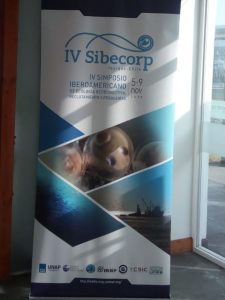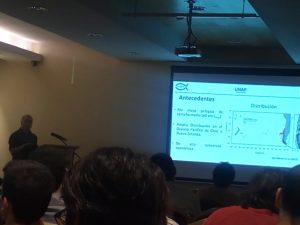SIBECORP was a success
November 20th, 2018
The V Ibero-American Symposium on Reproductive Ecology, Recruitment and Fisheries SIBECORP, was held in Iquique, Chile, from November 5 to 9
It was organized by the Faculty of Renewable Natural Resources of Universidad Arturo Prat and Fishing Promotion Institute with Ibero-American Fishing Research Network (INVIPESCA) support-
Carolina Hernández, IFOP researcher and event organizer explained “the activity was a success, since it allowed us to share experiences and knowledge with colleagues from different countries, thus allowing cooperation in fisheries research”
The event responds to Latin American researchers concern to promote collaboration among their countries, due to the importance of marine and continental fisheries as a vital economic resource for Latin America, Spain and Portugal. The main objective is to identify and define lines of research of common interest and encourage joint projects that promote cooperation among countries in the field of fisheries research.
IFOP Research Works
“Interannual variation of reproductive process in three fins hake (Micromisistius Australis) in extreme south of Chile between 1997 and 2017″, by Authors: Claudio Bernal, Carola Hernández, Luis Adasme and Rodrigo San Juan, changes of three fins hake reproduction process date and duration for the last 20 years. This resource is overexploited and is captured from the Lagos region to the Magallanes region in southern Chile.
Reineta (Brama australis): Reproduction and hypothesis about its life cycle in the Pacific Ocean
Authors: Elson Leal, Eduardo Diaz, Gabriel Claramunt, Sergio Neira
Information on reproductive traits of Reineta and its life cycle is scarce. Through reproductive tissue analysis, it was confirmed, as in previous studies, that females mature on average at 38 cm in length. Based on the absence of specimens in recent reproductive activity, in this and other studies, the possibility arises that the main reproductive process of the species could be carried out in areas far from the coast, outside fleet area operation. It is necessary to continue studying reproductive process and distribution patterns of this species of high economic and social importance.

Study of larval development of southern sardine (Sprattus fueguensis) under captive conditions: First feeding and formation of micro-increments in otoliths.
Authors: Guillermo Moyano A, Elson Leal F & Francisco Cerna T.
The moment of the first feeding in fish larvae has been described as a critical period, which determines to a great extent their survival and consequently the success of the recruitment. In the present study, the ontogenetic development of southern sardine larvae obtained under laboratory conditions (Hueihue hatchery – IFOP) was analyzed. Where the relationship between the oral opening for the first feeding, functionality of the eye and formation of the first mark in the otolith sagittae was studied.
